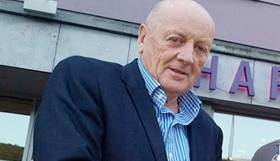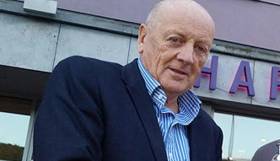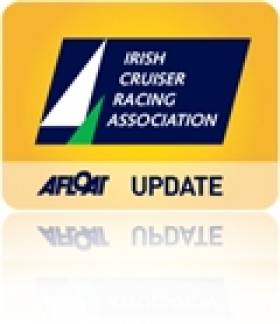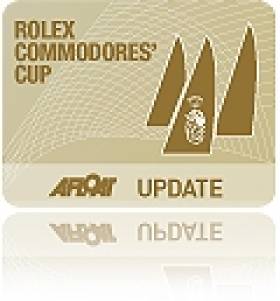Displaying items by tag: Norbert Reilly
Nobby Reilly Details Decision To Resign From ICRA
#ICRA - Norbert ‘Nobby’ Reilly has spoken to Afloat.ie to clarify his comments over his resignation from the Irish Cruiser Racing Association (ICRA) last week.
As previously reported on Afloat.ie, the Howth Yacht Club sailor and former ICRA commodore left the organisation on the eve of a crucial symposium at the weekend to decide its future, citing disagreements with its direction over the previous year.
Among these were claims that little of its funding boost since signing a memorandum of understanding with Irish Sailing went to new training programmes or recruitment of new members.
Reilly also referred to the decision to make Galway the host venue of the 2018 ICRA Nationals was not passed by the executive, and that the first he learned of it “was on Facebook”.
Commenting to Afloat.ie on Friday, IRCA commodore Simon McGibney said that Reilly had been given a fair hearing regarding his complains, adding that decisions “are always done by majority”.
But Reilly has hit back at assertions that there is “democracy” in the organisation, claiming that no minutes of meeting have been produced where Galway was agreed as this year’s venue.
Following the announcement, Reilly says there was “a storm of protests” from Dublin-based cruiser racers.
A survey was sent out to all members to gauge whether or not they sailed in the 2017 ICRA Nationals at the Royal Cork, the results of which have yet to be officially published.
“All summer ICRA received emails and calls protesting about Galway,” adds Reilly. “I requested that same be made available to [the] ICRA exec but reply received [was] “These were personal to the commodore.’”
Reilly says there was a push within the organisation for an EGM to review the danger of becoming irrelevant to the Dublin fleet, which constitutes the majority of IRCA’s membership.
Instead, a full executive meet was arranged, but Reilly claims that its members had not all been made aware of the complains from the Dublin membership, and that the resulting meeting only saw 50% attendance.
Reilly says his pitch to the executive that IRCA talk with Galway with a view to keeping Dublin as a host venue for the 2018 calendar was voted down — and he was further shot down over his request that Dublin keep a slot by running an East Coast IRC.
“The exec in ICRA is just irrelevant,” adds Reilly on his decision to resign. “Recently two new members [were] added with no discussion or prior notice.”
Norbert Reilly Resigns From ICRA On Eve Of Crucial Symposium
#ICRA - Norbert 'Nobby' Reilly has resigned from the Irish Cruiser Racing Association (ICRA) over disagreements with its direction in the last 12 months.
In his resignation letter submitted yesterday (Thursday 18 January), the Howth Yacht Club stalwart and former ICRA commodore suggested that it is “probably a good time to wind up” the association, on the eve of a symposium to determine its future direction.
Reilly accused ICRA of “getting in the way of its own plan” since a memorandum of understanding signed in 2016 with the ISA, now Irish Sailing, led to a boost in its finances for cultivating and promoting cruiser racing in Ireland.
Of its €50,000 budget for 2017 — four times ICRA’s revenue in 2015 — allocations of €11,000 were made for training and €8,500 for recruitment via CrewPoint.
But Reilly claims only €2,000 of the former was spent in clubs (Howth YC and the Royal Cork) which already have training programmes in place, with little spend or results for the latter.
Fixture clashes, disputes over venue selection, a drop in crew numbers and a poor return from its communications/web and social media budget are some of the other issues cited by Reilly in influencing his decision.
Specifically, Reilly says that the selection of Galway as host venue of this year's ICRA Nationals was not passed by the executive, and that the first he knew of the decision “was on Facebook”.
Speaking to Afloat.ie on Reilly’s resignation, ICRA commodore Simon McGibney paid tribute to his contributions to cruiser racing, but added that the departing executive’s comments should not affect plans for the weekend symposium, which starts tomorrow morning in Limerick.
“Strategically what we’re trying to do is to take a good look and review where we [as ICRA] want to see ourselves in the next five years, and that has always been the case going forward.”
McGibney added that he believes Reilly was given a fair hearing from the ICRA board, but decisions “are always done by majority”.
Regarding the ICRA Nationals in Galway this August, McGibney dismisses suggestions that the event would not be a ‘true nationals’ without the presence of Dublin boats because “there is a rotation of where the Nationals will be hosted” as bound by the ICRA constitution.
“Galway is an ideal location to bring it to the West Coast,” he added, urging people to “look at the bigger picture” of the event as “a promotion for cruiser racing on a national level.”
#commodorescup – The two managers behind both of Ireland's Commodore's Cup victories have 'stepped down' from the job, an executive meeting of the Irish Cruiser Racer Association (ICRA) heard last month. A successor for both Barry Rose of Royal Cork YC and Fintan Cairns of the Royal Irish YC is being sought by the cruiser–racer body to defend the international title next season on the Solent. The midlands meeting heard ICRA's shore management performed 'a very important role as a focal point and coordinator for the whole team process' .
It was imperative, according to the meeting, chaired by Howth YC's Nobby Reilly, that ICRA would continue to perform that role in the future. The Portlaoise gathering of April 20th also heard of the necessity to start the process of 'achieving team or team selection' to challenge in 2016. The quest for team sponsorship also needs to be underway.
Separately, Royal Cork's Commodore's Cup team captain Anthony O'Leary has told Afloat.ie of his 'fervent hope' to be involved with the 2016 defence of the Cup that he has won twice. However, his Ker 39, Antix has been sold to Sweden and this year O'Leary and his Antix crew are campaigning offshore in the renamed Ker 40, Catapult. They take in RORC's Myth Of Malham this week before June's Dun Laoghaire to Dingle race. They're both warm–up races for the season's big one in August, the sell–out Fastnet race.
The 2016 Commodore's Cup changes will see the reintroduction of a small boat for the team competition next year it has also been announced. The Royal Ocean Racing Club (RORC) has agreed to a number of changes that they say will have 'a positive impact' on the number of teams taking part in the event held at Cowes, Isle of Wight between 23 and 30 July 2016.
The first is the requirement of every team to have a small boat with a rating between 1.000 and 1.049. 'Many teams in the last event believed that it was hard to be competitive without having three boats that were close to the top of the allowable rating band, as was the case of last year's winning Irish team,' said RORC CEO, Eddie Warden Owen.
As the Irish Times Sailing Column reports, lowering the rating band to 1.000 will make it easier for J109s to enter, to include boats like the JPK10.10, A35 and the new Sunfast 3200, and reduce the cost of competing.
Read also: How Ireland won the Commodore's Cup and Anthony O'Leary, Sailor of the Year
Commodores Cup: Send YOUR Good Luck Wishes HERE!
MANY OF YOU SENT GOOD LUCK WISHES AND NOW YOU CAN SAY WELL DONE TOO! SCROLL DOWN THE PAGE TO LEAVE YOUR CONGRATULATION MESSAGE!
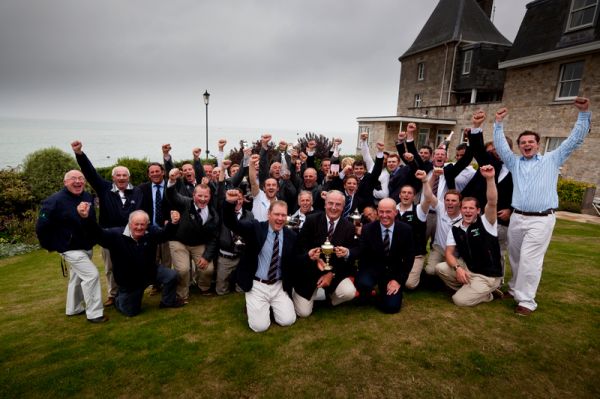
The ICRA Team Celebrations in Cowes, Photo: David Branigan
After a series of near misses in the Commodores Cup, there are many reasons why 2010 was an entirely appropriate timing for an Irish win in Cowes today.
Ireland's single three boat team (below) faced stiff opposition in the final ten team line up. Individual performances this season though, including a win at the British IRC Nationals, is proof, were it needed, that Ireland still was always on course to win the Commodores Cup.
Ireland's team on the Solent was Royal Cork based; Antix, Anthony O'Leary (Ker 39); Marinerscove.ie David Dwyer (Mills 39) and Roxy 6 Robert Davies (Corby 36). The full crew list for each boat is below, representing the very best of Irish sailing talent.
Third time lucky is how it was scripted in 08, but not how it was acted out. After first being jilted by the French and now, for the second time, by the English, the Irish could be forgiven for giving up on the cup but we never did. This victory represents the final week of eight months preparation for superb assault on the title.
PLEASE SCROLL DOWN TO THE END OF THE PAGE AND LEAVE YOUR CONGRATULATIONS MESSAGE!

Team Ireland 2010 Commodores Cup
Photos by Robert Bateman
IRL3939 Antix Anthony O'Leary (Ker 39)
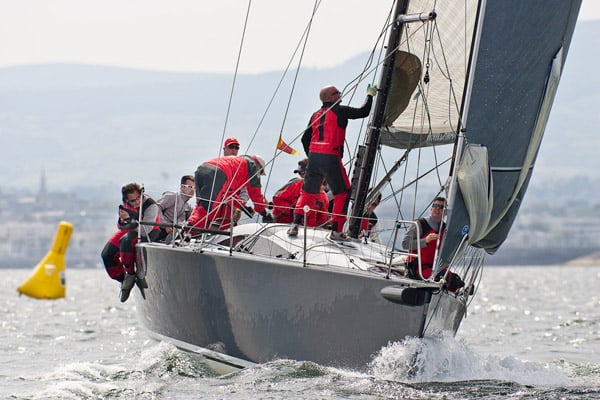
Anthony O'Leary (IRL)
David Lenz (GBR)
Peter O'Leary (IRL)
Ross Deasy (IRL)
Brian Lennon (IRL)
Stephen O'Sullivan (IRL)
Eoin Leahy (IRL)
Frederick Cudmore (IRL)
Simon Johnson (IRL)
Rory O'Sullivan (IRL)
Jimmy Houston (GBR)
Derek Moynan (IRL)
Tom Durcan (IRL)
Robert O'Leary (IRL)
Darragh O'Connor (IRL)
IRL39000 Marinerscove.ie David Dwyer (Mills 39)
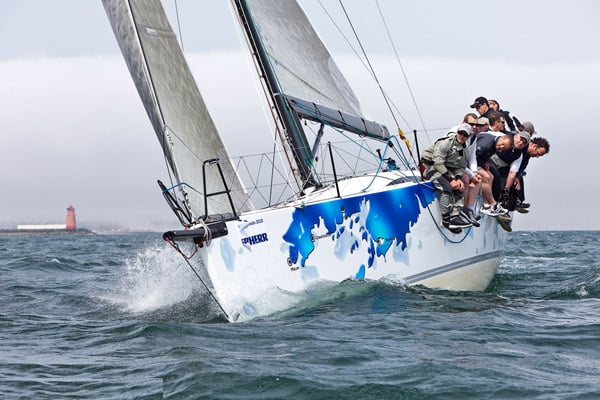
Andy Beadsworth (GBR)
David Bolton (IRL)
Padraig Byrne (IRL)
Alan Curran (IRL)
David Dwyer (IRL)
Bernard Fitzpatrick (IRL)
Brian Heneghan (IRL)
David Love (IRL)
Tom Murphy (IRL)
Nicholas O'Leary (IRL)
Clive O'Shea (IRL)
Sandy Rimmington (IRL)
Chris Schirmer (GBR)
Don Wilson (IRL)
IRL36000 Roxy 6 Robert Davies (Corby 36)
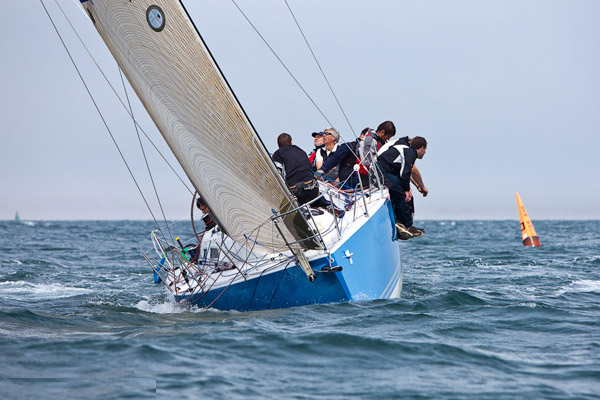
Rob Davies (GBR)
Andrew Creighton (IRL)
Marty O'Leary (IRL)
Jim Hughes (IRL)
Paul Farries (GBR)
Nelson Moore (IRL)
Tom Whitburn (GBR)
Michael Liddy (IRL)
Aidan O'Connell (IRL)
Maurice O'Connell (IRL)
Team Management:
Barry Rose, Fintan Cairns, Denis Kiely, Mike Broughton and Norbert Reilly
- RORC
- Anthony O'Leary
- Norbert Reilly
- ICRA
- Eoin Leahy
- Maurice O'Connell
- Commodores Cup
- Fintan Cairns
- Peter O'Leary
- antix
- Mike Broughton
- roxy 6
- Mariners Cove
- David Lenz
- Ross Deasy
- Brian Lennon
- Stephen O'Sullivan
- Frederick Cudmore
- Simon Johnson
- Rory O'Sullivan
- Jimmy Houston
- Derek Moynan
- Tom Durcan
- Robert O'Leary
- Darragh O'Connor
- Andy Beadsworth
- David Bolton
- Padraig Byrne
- Alan Curran
- David Dwyer
- Bernard Fitzpatrick
- Brian Heneghan
- David Love
- Tom Murphy
- Nicholas O'Leary
- Clive O'Shea
- Sandy Rimmington
- Chris Schirmer
- Don Wilson
- Rob Davies
- Andrew Creighton
- Marty O'Leary
- Jim Hughes
- Paul Farries
- Nelson Moore
- Tom Whitburn
- Michael Liddy
- Aidan O'Connell
- Barry Rose
- Denis Kiely



























